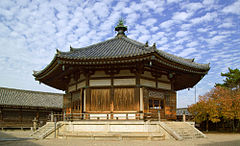Hōryūji (法隆寺) is a large Buddhist temple complex situated in Ikaruga Town (near Nara), Nara Prefecture in Kansai region of Japan.
Understand
edit
The town of Horyuji has grown around the eponymous temple of Horyuji, the "Temple of the Flourishing Law". One of Japan's oldest and grandest Buddhist temples, the temple dates back to 607, when it was constructed on the order of Prince Shotoku to house an image of the Yakushi (Medicine) Buddha, and was designated among Japan's first UNESCO World Heritage sites. It's also the oldest surviving wooden structure in the world.
Get in
editBy train
editJR Horyuji station is on the Yamatoji line, 12 minutes from Nara, 2 mins from Oji and 23 minutes from Tennōji in Osaka. The temple is located 20 minutes on foot from the station, although if you don't like walking, you can take a bus (route 62, 63 and 92) to spare yourself the hike: buses run frequently and direct from in front of Oji station.
By bus
editIf you want to take the bus instead of train from Nara, route 98 (60 mins, ¥770) takes you straight to Horyuji.
Get around
editThe temple can only be covered on foot.
See
edit|
Horyuji in Tokyo
If you want to see a piece of Horyuji without the hassle of going there, the National Museum in Ueno, Tokyo has an entire building devoted to works donated by the temple. |
The sprawling grounds of the temple (over a kilometer wide) pack in no less than 20 gates or buildings designated as National Treasures or Important Cultural Properties. The area can be divided into the Western Temple (西院 Sai-in) and the Eastern Temple (東院 Tō-in), the western area being the older of the two. The temple is open daily from 08:00 to 16:30 (or later) and admission is ¥1000.
The following listing is in the order of the usual recommended itinerary, starting from the usual approach at the southern gate and ending at the eastern end of the complex.
Western Temple
edit
- Nandaimon (南大門, "South Great Gate"). A suitably grand entrance, this National Treasure dates to 1438.
- Chūmon (中門, "Center Gate"). This Asuka-era gate marks the entry into the inner sanctum inside the Kairō (回廊). The Kongo-rikishi guardian statues on the sides of the gate are the oldest in Japan.
- Kondō (金堂, "Golden Hall"; also Kondō). Dating to c. 700 and purportedly the oldest wooden building in the world, this squat Asuka-era edifice is also known for the priceless statues and frescoes within — expect queues to get in. Located in the Kairo.
- Gōjūnotō (五重塔, "Five Story Pagoda"). The Laurel to Kindo's Hardy, this graceful five-story pagoda is the oldest in Japan and a much-copied archetype. Located in the Kairo.
- Daikōdō (大講堂, "Great Teaching Hall"). On the north side of the Kairo, this hall dating from the Heian era (990) is one of the largest buildings in Horyuji.
- Daihōzōden (大宝蔵殿 "Great Treasure Store Hall"). A modern building housing a permanent exhibition of some of the temple's wealth, accumulated over a millennium. Contains many objects which were originally part of Horyuji, including the nationally famous Kudara Kannon.
- Tōdaimon (東大門, "East Great Gate"). This stately gate was once another entrance into the temple, but now marks the division between the west and the east halves of the complex.
Eastern Temple
editOther
edit- Chūgū-ji Temple (中宮寺). A separate temple just outside the northeastern tip of the complex, originally the residence of Shotoku's mother and famed for its statue of the boddhisattva Miroku (the Future Buddha). The building where the statue is housed is an ugly modern construction. This temple is owned by a competing Buddhist sect and a separate admission of ¥500 is charged.
From here you can walk 5 minutes south to the main road and catch a bus back to the station.
Buy, eat & drink
editThe approach to the temple is lined with the usual array of eateries, teahouses and souvenir shops. What looks like a Country and Western bar (complete with a plastic horse in the parking lot) is a very good okonomiyaki restaurant.
Sleep
editMost visitors choose to daytrip from Nara or other cities nearby.
- 1 Waqoo Horyuji (門前宿 和空法隆寺), 1 Chome-5-32 Horyuji, Ikaruga, Ikoma District, ☏ +81 745-70-1155. Both tatami and beds are available. Doubles ¥54,000+.

